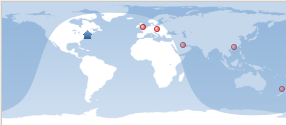 The tzdata package contains data files documenting both current and historic transitions for various time zones around the world. This data represents changes required by local government bodies, or by time zone boundary changes, as well as changes to UTC offsets and daylight saving time.
The tzdata package contains data files documenting both current and historic transitions for various time zones around the world. This data represents changes required by local government bodies, or by time zone boundary changes, as well as changes to UTC offsets and daylight saving time.
Occasionally, tzdata changes are announced without a lot of lead time or with incomplete information. In these cases, we try to plan for different scenarios and rely on the upstream maintainer to make decisions based on his long term experience. Once an update is ready, we update our sources and our quality assurance and release engineers help push the update out as quickly as possible.
The IESG (Internet Engineering Steering Group) designated TZ Coordinator is Paul Eggert. Periodically or as required for correctness upstream tzdata updates are released on the iana.org web site (http://www.iana.org/time-zones). You can also find information about subscribing to the tzdata email list and accessing the archives on this site.
Red Hat picks up tzdata releases within 24 hours of an upstream release. The NEWS file is reviewed to determine what has changed and to check for any unanticipated changes that could impact customers. The new tzdata and tzcode tar files are uploaded to our source repository, tzdata.spec is modified to reflect the new changes, and integrated into Red Hat supported versions of RHEL 4, 5, 6, and 7. The resulting packages are installed on test systems and the expected future time zone changes are tested and confirmed. We also perform a zdump -v of all time zones and compare this against the previous release to confirm that only expected changes are present. At this point, we pass the updated packages to our quality assurance engineers for extensive testing. It takes a minimum of 5 business days from the time upstream releases a tzdata update to complete the integration, testing, and release process.
Our QA testing includes rpm testing, comparing the contents of the old and new packages. Sanity testing checks whether it is possible to update to the new packages on a real system, delete them, install them, downgrade them, and rebuild their source RPM (as long as we ship it). Sanity testing is performed for each RHEL version, variant and architecture the erratum is applicable to. If a change is requested by a customer, quality assurance engineers write regression tests. These regression tests are also run for each new tzdata update.
Once our quality assurance engineers have completed their testing and verification process, someone from the documentation team reviews and updates the erratum documentation.
Finally, the tzdata packages are passed to our release engineers. Releases are packaged and released to Red Hat's customers and partners via Red Hat Enterprise Linux asynchronous errata.
There is also a Red Hat tzdata status page available on the Customer Portal - Red Hat Enterprise Linux Timezone Data (tzdata) - Development Status Page (dates are approximate):
https://access.redhat.com/articles/1187353
In the past, Red Hat did not immediately release updates for changes to past time zones, documentation typos, or other non-urgent changes unless a customer requested it or until a future time zone change warranted an update. Based on customer and partner feedback, we have changed that policy.
From tzdata-2014h onwards (September 2014), Red Hat plans to routinely release all tzdata updates, subject to testing and qualification, and aims to do so promptly after each upstream release. Integration and testing of a tzdata update is expected to take a minimum of 5 business days prior to releasing the update to our customers and partners. Red Hat aims to minimize this time. Where identified, Red Hat handles tzdata regressions and other major bugs on a case-by-case basis.
